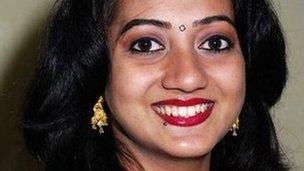Savita Halappanavar: Health Service Executive review identifies failings in her care
- Published

Savita Halappanavar, 31, died last year, days after a miscarriage in a County Galway hospital
A Health Service Executive review into the death of a woman who was refused an abortion at an Irish hospital has identified failings in her health care.
Savita Halappanavar died from infection last October, days after a miscarriage.
Her family believes she would have survived had she received an abortion.
The HSE review concluded staff did not adequately monitor her deteriorating condition and failed to "offer all management options to a patient experiencing inevitable miscarriage".
'Increasing risk'
The report also said existing clinical guidelines related to the management of sepsis and septic shock were not correctly adhered to by staff.
The review team stated: "There was a lack of recognition of the gravity of the situation and of the increasing risk to the mother which led to passive approaches and delays in aggressive treatment.
"This appears to have been either due to the way the law was interpreted in dealing with the case or the lack of appreciation of the increasing risk to the mother and the earlier need for delivery of the foetus," the report said.
Mrs Halappanavar, a 31-year-old dentist from India, died as a result of septic shock from an E coli. infection at University Hospital Galway on 28 October 2012.
Her widower, Praveen Halappanavar, told the media she had repeatedly requested a termination during her miscarriage.
He said doctors refused her request because of the presence of a foetal heartbeat.
'Legal change'
The HSE review has concluded that there was "an apparent over-emphasis on the need not to intervene until the foetal heart stopped together with an under-emphasis on the need to focus appropriate attention on monitoring for and managing the risk of infection and sepsis in the mother".
The investigation team's report added: "The interpretation of the law related to lawful termination in Ireland, and particularly the lack of clear clinical guidelines and training is considered to have been a material contributory factor in this regard."
The review team added that "similar incidents with a similar clinical context could happen again" unless there was "clarity as to the application of the law in a situation where it may be necessary for a doctor to consider, in the exercise of their clinical professional judgement, the termination of a pregnancy in the clinical welfare interest of their patient".
The report also said there could be a repeat of the Halappanavar case in the "absence of appropriate national clinical guidelines on the clinical management of inevitable miscarriage".
Among its recommendations, the review team stated: "There is an immediate and urgent requirement for a clear statement of the legal context in which clinical professional judgement can be exercised in the best medical welfare interests of patients."
In its call for new guidelines for doctors, the team added: "We recognise that such guidelines must be consistent with applicable law and that the guidance so urged may require legal change."
Controversy
In April, an inquest into Mrs Halappanavar's death recorded a verdict of medical misadventure.
The eight-day hearing, held in Galway, concluded there had been failures in her health care at the hospital, but did not apportion individual blame.
The inquest found there had been poor communication between staff members, inadequate assessment and monitoring and a failure to follow up blood test results that would have indicated the presence of infection.
Following world-wide controversy over Mrs Halappanavar's death, which reopened the debate about the Irish Republic's abortion law, the HSE launched its clinical review of her health care last November.
The HSE team has spent months examining her healthcare records and conducted 26 interviews with key staff involved in her care.
'Deeply saddened'
Those interviewed for the clinical review included consultant obstetricians and gynaecologists, midwives, managers and consultant microbiologists.
The investigation team said staff who cared for Mrs Halappanavar were "deeply saddened by the patient's tragic and untimely death".
Their report added that this was "the first direct maternal death" to have occurred at the hospital in 16 years, during which time staff had dealt with more than 50,000 births.
Earlier on Thursday, a copy of the HSE's final report was given to the legal representative of the her widower, as Mr Halappanavar is out of the country at present.
The HSE review has been controversial from its launch last November, when Mr Halappanavar said he had "no confidence" that it would be an independent investigation.
The widower publicly objected to the inclusion of three employees of the hospital on the panel and within 24 hours they had been replaced, amid concerns of a conflict of interest.
- Published15 May 2013
- Published14 November 2012